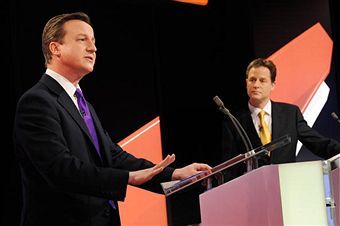 Post-election deals are tough for those on the wings of political parties – the
activists, the die-hards, the idealists. Those in the middle, by definition the pragmatists, find it easier to prioritise aims or to compromise in the short-term in order to win over the long-term.
Post-election deals are tough for those on the wings of political parties – the
activists, the die-hards, the idealists. Those in the middle, by definition the pragmatists, find it easier to prioritise aims or to compromise in the short-term in order to win over the long-term.
Any Con-Lib deal will be tough for the left-wing of the Lib Dems and the right-wing of the Conservative party. But both will have to accept that power is better than opposition and that being able to implement part of your party programme is better than carping on the sidelines, your manifesto languishing on never-visited websites.
To make the most of a political shotgun marriage, both David Cameron and Nick Clegg will be compelled to reduce their demands to the key issues and present a list of things that they will not, indeed cannot, compromise on. The rest, I’m afraid, will have to be dealt with on a case-by-case basis and probably later in a parliament.
That, to the frustration of some Coffee House bloggers, will mean that a government lead by David Cameron will not go to war with the EU. To Lib Dems it means that a government they lend votes to will not implement some of the redistributive policies in their party’s manifesto.
But the process may have one benefit – it may curtail the ambition of government. A coalition government may be forced to reduce the things it seeks to do – it may simply not be able to agree on a comprehensive programme. That, in itself and during an economic crisis, will be welcome.
Such an outcome is not a given. Coalition-making faces an opposing tendency: to expand work. Kenya’s coalition government produced more than a hundred ministers, with each faction getting a little something for their support. But I hope that on 7 May – if a coalition does become necessary – the countervailing tendency will prevail.






Comments